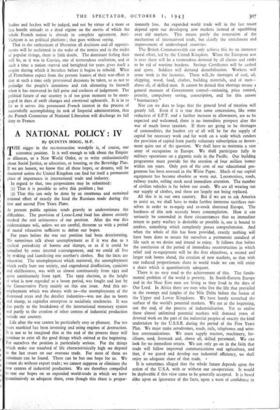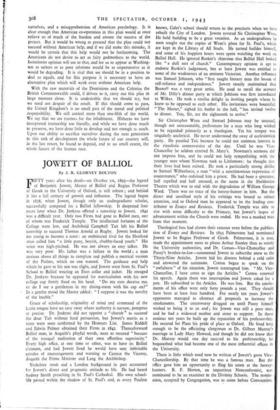A NATIONAL POLICY: IV
By QUINTIN HOGG, M.P.
THE nigger in the reconstruction woodpile is, of course, our economic position. It is well enough to talk about the Empire or alliances, or a New World Order, or to write enthusiastically about Social Justice, or education, or housing, or the Beveridge Plan. If we are honest, we know that all these hopes, or dreams, will be shattered unless the United Kingdom can find for itself a permanent place of importance in international trade and industry.
In regard to that, two propositions may be submitted: (r) That it is possible to solve this problem ; but
(2) That this can only be done by an enormous and sustained national effort -of exactly the kind the Russians made during the first and second Five Years Plans.
At present public opinion tends gravely to underestimate the difficulties. The provision of Lease-Lend food has almost entirely masked the real seriousness of our position. After the war this underestimate wili, unless we are careful, threaten us with a period of moral relaxation sufficient to defeat our hopes.
For years before the war our position had been deteriorating. We sometimes talk about unemployment as if it was due to a cyclical periodicity of booms and slumps, or as if it could be remedied by some internal rzarrangement, and we could all live by making and laundering one another's clothes. But the facts are otherwise. The unemployment which mattered, the unemployment which really hurt our society, and engendered disaffection, cynicism and shiftlessness, was with us almost continuously from 1921 and quite continuously from 1926. The 1929 election, at the height of what is now regarded as a boom period, was fought and lost by the Conservative Party mainly on . this one issue. And this un- employment which was always with us—the unemployment of the distressed areas and the derelict industries—was not due to boom and slump, to capitalist enterprise or socialistic tendencies. It was due partly to the breakdown of the international monetary system and partly to the creation of Other centres of industrial production outside our country.
Life after the war cannot be particularly easy or pleasant. For ten years mankind has been inventing and using engines of destruction. It is not to be imagined that at the end of the process there will continue to exist all the good things which existed at the beginning. For ourselves the position is particularly serious. For the things which make our standard of life characteristically high we depend in the last resort on our overseas trade. For most of them no substitute can be found. There can be but one hope for us. We cannot do without export trade; we cannot suppress or eliminate the new centres of industrial production. We are therefore compelled to rest our hopes on an expanded world-trade in which we have quantitatively an adequate share, even though this share is propor-
tionately less, An expanded world trade will in the last resort depend upon our developing new markets instead of squabbling over old markets. This means partly the restoration of the mechanism of international trade, but chiefly the enrichment and improvement of undeveloped countries.
The British Commonwealth can only achieve this by an immense moral effort, led by the United Kingdom. When the European war is over there will be a tremendous demand by all classes and ranks to be rid of wartime burdens. Savings Certificates will be cashed and spent. Soldiers will demand demobilisation. Workers will cease work in the factories. There will, be shortages of coal, oil, shipping, wood, food, clothes, building materials, and of men— above all, of skilled men. It cannot be denied that shortage means a general measure of Government control—rationing, price control, priority, compulsory saving, conscription, and for this reason "bureaucracy."
Nor can we dare to hope that the general level of taxation will greatly fall. Even if it is true that some concessions, like some reduction of E.P.T. and a further increase in allowances, are to be expected and welcomed, there is no immediate prospect after the war of much lower taxation. If there are going to be shortages of commodities, the loudest cry of all will be for the supply of capital for necessary work and for work on a scale which renders the provision of capital from purely voluntary subscription or invest- ment quite out of the question. We shall have to maintain a vast army of occupation in Europe. We shall participate fully in military operations on a gigantic scale in the Pacific. Our building programme must provide for the erection of four million homes within ten years. Only part of the cost of our educational pro- gramme has been assessed in the White Paper. Much of our capital equipment has become obsolete or worn out. Locomotives, roads, railway tracks, rolling stock need immediate attention. The number of civilian vehicles is far below our needs. We are all wearing out our supply of clothes, and these are largely not being replaced.
All this is in our own country. But if we are to ask America to assist us, we shall have to make further immense sacrifices our- selves in order to re-equip and re-stock shattered Europe. The hardness of this task scarcely bears contemplation. How it can seriously be contended in these circumstances that an immediate return to party warfare is desirable or possible is, one is bound to confess, something which completely passes comprehension. And when the whole of this has been provided, exactly nothing will have been done to secure for ourselves a permanent standard of life such as we desire and intend to enjoy. It follows that before the conclusion of the period of immediate reconstruction in which relief and re-equipment will be the -first objectives, a second and larger task looms ahead, the creation of new markets, so that with our reduced proportionate share in world trade we can still enjoy a share which is quantitatively adequate.
There is no easy road to the achievement of this. The funda- mental problem of the world is poverty. In South-Eastern Europe and in the Near East men are living as they lived in the days of Our Lord. In Africa there are men who live the life that prevailed in the swamps and jungles of the Nile Delta before the fusion of the Upper and Lower Kingdoms. We have barely scratched the surface of the world's potential markets. We are at the beginning, not the end, of the process of industrialisation. Yet to realise these almosi unlimited potential markets will demand years of devoted Niork on the part of the industrial peoples of exactly the kind undertaken by the U.S.S.R. during the period of the Five Years Plan. We must make aerodromes, roads, rails, telephones and wire- less communications. We must supply tractors, machinery, fer- tilisers, seed, livestock and, above all, skilled personnel. We can look for no immediate return. We can only go on in the faith that trade will follow improved communications and agriculture, and that, if we guard and develop our industrial efficiency, we shall enjoy an adequate share of that trade. • It is sometimes alleged that the whole future depends upon the action of the U.S.A. with or without our co-operation. It would be deplorable if this view came to be generally accepted. It is based alike upon an ignorance of the facts, upon a want of confidence in ourselves, and a misapprehension of American psychology. It is clear enough that American co-operation in this plan would at once Telieve us of much of the burden and ensure the success of the project. But it would be wrong to pretend that the plan could not succeed without American help, and if we did make this mistake, it would be certain that this help would not be forthcoming. The Americans do not desire to act as _fairy godmothers to the world. Isolationist opinion will see to that, and for us to appear at Washing- ton as suitors or as poor relations would . be as unpersuasive as it would be degrading. It is vital that we should be in a position to deal as equals, and for this purpose it is necessary to have an alternative plan which will work even without American help.
With the raw materials of the Dominions and the Colonies the British Commonwealth could, if driven to it, carry out this plan in large measure alone. It is undesirable that we should try, but we need not despair of the result. If this should come to pass, the United Kingdom's is no small part of the moral and political responsibility. We still control more than one-fifth of the world. We say that we are trustees for the inhabitants. Hitherto we have interpreted trusteeship too literally, and while we have done much to preserve, we have done little to develop and not enough to teach. Upon our ability to sacrifice ourselves during the next generation to this task of development the whole future of our country will, in the last resort, be found to depend, and to no small extent, the whole future of the human race.



























 Previous page
Previous page